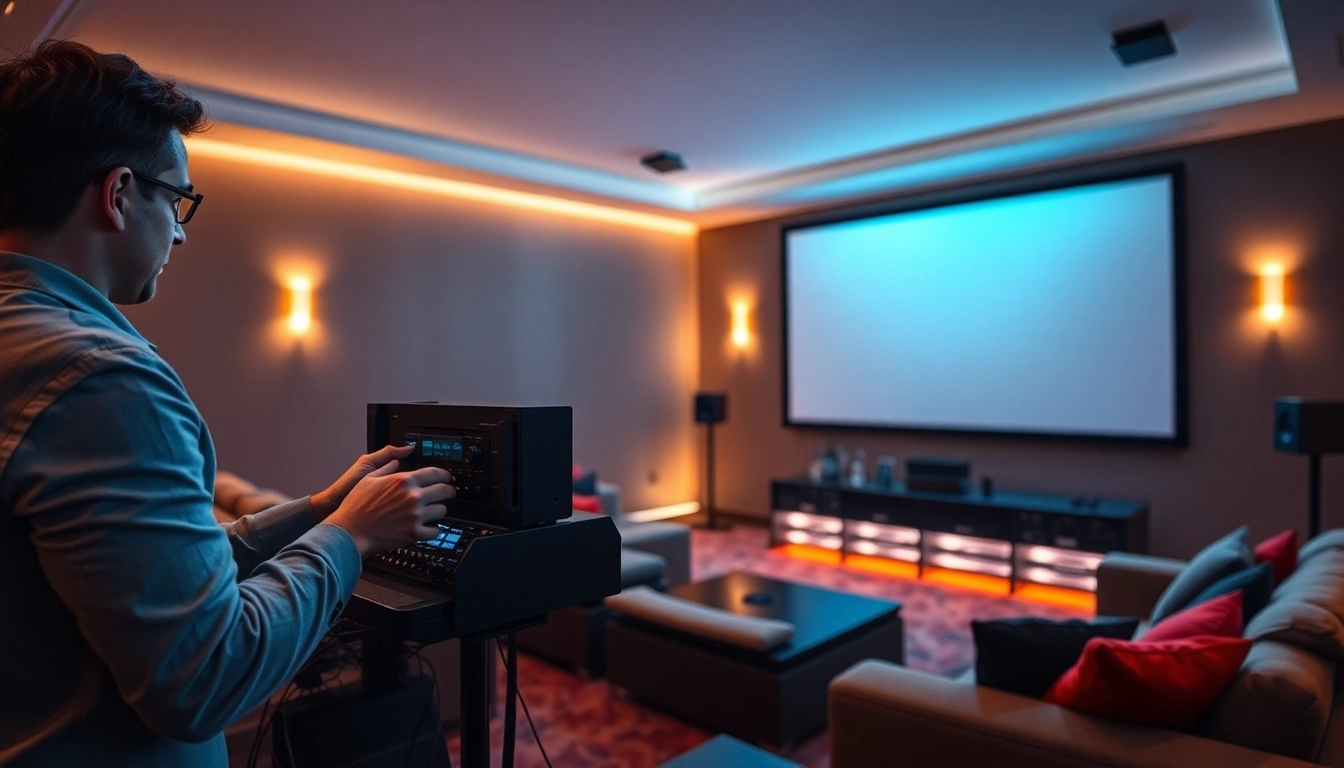Understanding Home Theater Installation
What is Home Theater Installation?
Home theater installation refers to the process of setting up a dedicated space in your home for watching movies, playing video games, and enjoying music with a surround sound experience. This includes choosing the right equipment, arranging seating, and integrating various audio-visual technologies to create a cinematic atmosphere. The goal is to replicate the movie theater experience right in the comfort of your own home, making it an exciting venture for entertainment enthusiasts.
Key Components of a Home Theater System
A typical home theater system is composed of several key components:
- Display: This can be a projector with a large screen or a high-definition television.
- Audio System: This includes speakers, subwoofers, and audio receivers. Understanding speaker placement is crucial for optimal sound quality.
- Source Devices: These are the devices that provide content, including Blu-ray players, gaming consoles, streaming devices, and even cable boxes.
- Control System: This involves remote controls or smart home systems that allow you to control all components seamlessly.
- Lighting: Proper lighting enhances the viewing experience, requiring smart solutions for dimming or controlling light sources.
Benefits of Professional Installation Services
While some homeowners may consider a DIY approach, professional home theater installation services provide numerous advantages:
- Expertise: Professionals have extensive knowledge of audio-visual technologies and the best practices for installation.
- Time Savings: Installation can be time-consuming; professionals can install systems efficiently.
- Customization: Experts can tailor the system to meet specific needs based on room layout and personal preferences.
- Support: Post-installation support allows users to troubleshoot issues and make adjustments more easily.
Finding Home Theater Installation Near Me
How to Search for Local Installers
When looking for home theater installation services, begin with a simple search for home theater installation near me. This initial search will present various local options, but here are some tips to refine your search:
- Use online directories such as Yelp and HomeAdvisor to find companies rated by other customers.
- Check social media platforms where local businesses often showcase their services and customer reviews.
- Ask friends and family for recommendations, especially if they have recently had systems installed.
Evaluating Services Available in Your Area
Not all installation services are created equal. To find the best fit for your needs:
- Read Customer Reviews: Look for testimonials from previous clients to gauge the contractor’s reliability and quality of work.
- Check Experience: Find out how long the company has been in business and their level of expertise with the technologies you need.
- Ask About Services: Ensure they offer a full range of services from consulting to installation, and have expertise in smart home integrations if that’s a need.
Understanding Cost Factors Associated with Installation
The cost of a home theater installation can vary significantly based on several factors:
- Equipment Costs: The quality of the display, speakers, and other technology will directly impact total expenses.
- Size of the Room: Larger spaces may require additional equipment and layout planning, increasing labor costs.
- Installation Complexity: More extensive systems or custom setups will also raise prices due to the expertise and time required.
- Location: Prices can vary based on geographic location and the cost of living in your area.
Choosing the Right Equipment for Your Home Theater
Must-Have Technologies for an Immersive Experience
To create an immersive home theater experience, consider investing in the following technologies:
- 4K UHD Display: Offers superior image quality compared to standard HD.
- Surround Sound Systems: Systems like 5.1 or 7.1 can provide a more enveloping sound experience.
- Streaming Devices: Options like Roku or Amazon Fire can enhance viewing options with access to various streaming services.
- Acoustic Treatments: Soundproofing materials can significantly reduce noise from outside the theater, enhancing audio quality.
Customizing Your Setup Based on Room Size
Room size plays a pivotal role in determining your home theater layout and equipment choice:
- Small Rooms: Opt for a compact setup, potentially with a sound bar and fewer speakers to avoid overwhelming the space.
- Medium Rooms: Consider a traditional surround sound system; the size allows for more flexibility in equipment choices.
- Large Rooms: Larger areas can accommodate multiple seating options and advanced sound systems with multiple speakers.
Popular Brands and Models in Home Theater Systems
There are numerous brands known for their quality and innovation in home theater systems:
- Sony: Renowned for their projectors and sound systems, offering great quality for both audio and visual equipment.
- Samsung: Famous for their high-definition TVs and soundbars that integrate seamlessly with other devices.
- Harman Kardon: Known for high-end audio systems, their receivers are a favorite among audiophiles.
- Bose: Offers premium sound systems with sleek designs suited for various room designs.
Installation Process: What to Expect
Initial Consultation and Assessment
Before the installation begins, professionals typically conduct an initial consultation:
- Understanding Needs: The installer asks about your preferences, budget, and intended use of the system.
- Room Assessment: They evaluate your room for size, layout, and potential challenges, such as acoustics and lighting.
- Equipment Recommendations: Based on this assessment, they provide a tailored list of recommended equipment and an estimated timeline for installation.
Installation Day: Steps and Timeline
On the installation day, the process typically includes several steps:
- Setup: The team arrives with the necessary equipment and tools, ensuring everything is ready for the installation.
- Wiring: Proper wiring is crucial for audio and visual performance, often including cable management to keep the area tidy.
- Testing: After installation, the system is thoroughly tested to ensure seamless operation of all components.
- Demonstration: Finally, installers provide a demonstration of how to use the system, including remote controls and smart home integrations.
Post-Installation Support and Troubleshooting
After the installation, quality service providers offer ongoing support:
- Customer Training: They usually provide thorough training on how to operate the system effectively.
- Technical Support: Many companies offer support for troubleshooting any potential issues after installation.
- Upgrades: Home technology evolves rapidly, and installers can provide advice on future upgrades or enhancements.
Enhancing Your Home Theater Experience
Smart Home Integration with Your Theater
Integrating smart home technology can elevate your home theater experience:
- Smart Controllers: Devices like Amazon Echo or Google Home can control your theater with voice commands.
- Automated Lighting: Adjusting lights based on what’s being watched can create the perfect cinematic environment.
- Home Security: Integrating security cameras or alarms can add peace of mind while enjoying entertainment.
Soundproofing Techniques for Better Audio Quality
Sound quality can be influenced by how well your theater is soundproofed:
- Acoustic Panels: These help minimize sound reflection, providing clearer audio experience.
- Carpeting: A thick carpet can absorb sound and improve acoustics within the room.
- Seals and Doors: Ensure doors and windows are sealed properly to minimize external noise interference.
Future Trends in Home Theater Technology
The home entertainment industry is evolving with incredible advancements:
- 8K Technology: As televisions move toward 8K resolutions, this will redefine the viewing experience.
- Virtual Reality: Prospective VR integration promises to bring a more immersive experience when gaming or watching films.
- Enhanced Streaming Services: As internet speeds increase, streaming home theater experiences will improve in quality.


